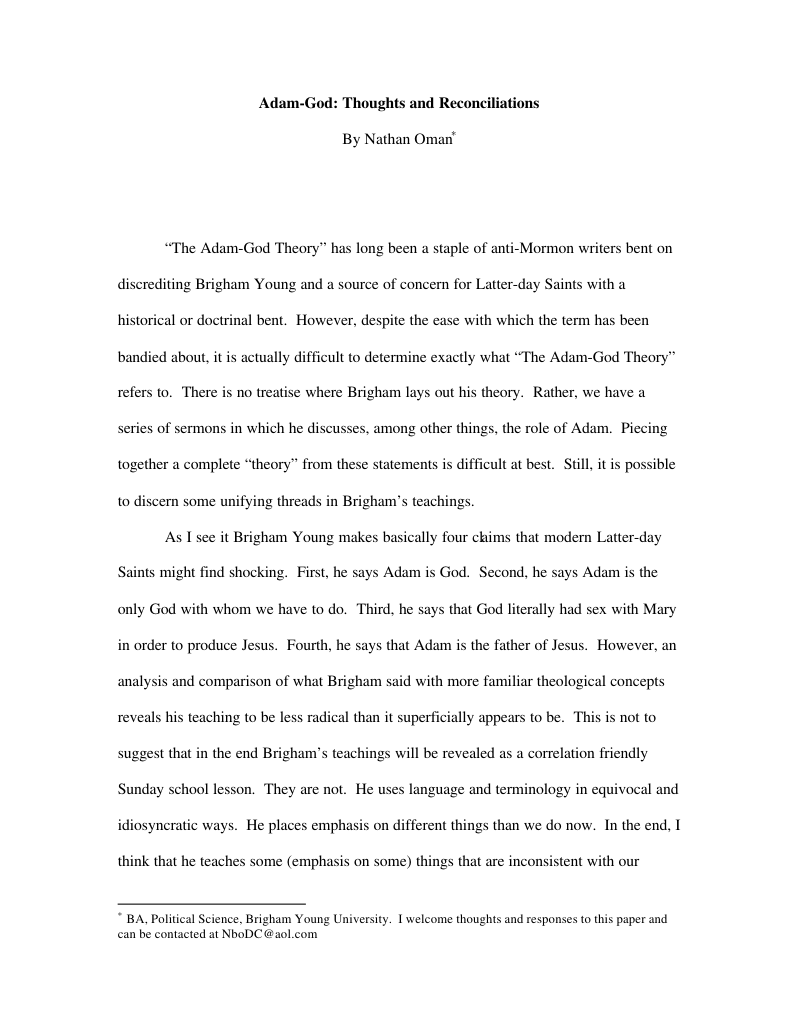Nate Oman discusses Adam-God and issues such as the ambiguity of the terms "God" and "Father"; concludes that Brigham was inconsistent.
- Type
- Website
- Source
- Nate Oman LDS
- Hearsay
- Direct
- Reference
Nate Oman, "Adam-God: Thoughts and Reconciliations," aliveonline.com, accessed January 3, 2023
- Scribe/Publisher
- aliveonline.com
- Audience
- Internet Public
- Transcription
Brigham was Simply Inconsistent. In the end, I think the most plausible understanding of Brigham’s teachings on Adam and the parentage of Jesus is simply that he was inconsistent. Brigham conceived of the past eterneties as being filled with succeeding generations of gods. Adam, he taught, was a god, but he had had a father who was also a god, and that god had a father who was a god. He declared “I believe in the eternities of worlds, saints, angels, kingdoms, and gods: In eternity without beginning. I believe the gods never had a beginning . . .” Among these gods, he knew that one was the literal father of Christ and the father of our spirits. During one period he taught that that god was Adam and at other times he pushed it back another generation and taught it was Elohim. Thus, it seems certain that on some occasions he said that Adam was the father of Christ and Wilford and Heber certainly understood him in this way. Yet on other occasions he taught that Adam and Jesus were of the same generation and shared the same father. Speaking on another occasion Brigham taught that “[Adam] honored his calling, believed in his Saviour, or Elder Brother, and by his faithfulness, was redeemed, and got a Glorious Resurrection.”
If this understanding is correct, it need not diminish our regard for Brigham as a prophet. Brigham once taught that men “must live in Revelation,” and more perhaps than any other latter-day prophet he sought to articulate a vision of life in which everything is imbued with the Spirit of God. But he did not insist that all his understandings came as a direct dictation from deity. In an 1854 sermon discussing the role of Adam, he outlined the source of his teachings. “I will tell you what I think about it, and as the [Southerners] say I reckon, and as the Yankees say I guess: but I will tell you what I reckon. . . . How are we going to know this? I reckon it. ” Brigham pondered on what he had learned from Joseph, the scriptures, the temple, and revelation, and then he offered his best understanding of things. To the extent that he taught that Adam was the literal father of Jesus, his interpretation has since been replaced by one endorsed by a unanimous First Presidency and Quorum of the Twelve. Brigham himself had a healthy skepticism about the importance of some of his teachings. “I do not pretend to say that the items of doctrine, and ideas I shall advance are necessary for the people to know, or that they should give themselves trouble about them whatever.”
- Source Link
- https://web.archive.org/web/20040917064733/http://www.aliveonline.com/ldspapers/AdamGod.pdf
- Citations in Mormonr Qnas
The B. H. Roberts Foundation is not owned by, operated by, or affiliated with the Church of Jesus Christ of Latter-day Saints.

